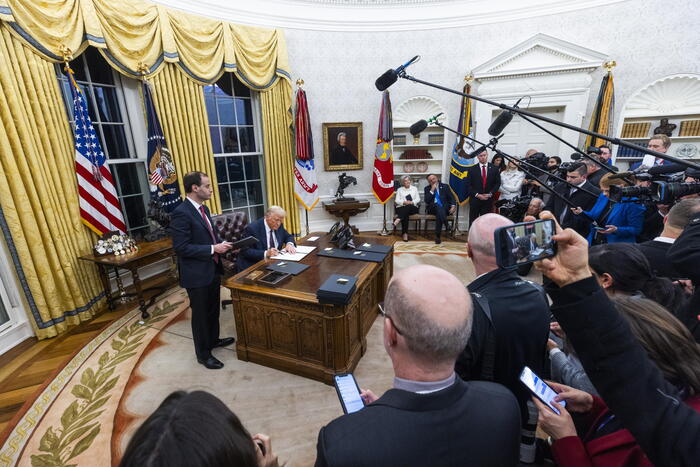Two Associated Press reporters testified yesterday about the damage caused by President Trump’s move to exclude the agency from the White House press pool. The decision in question came shortly after Trump returned to Washington DC for a second term, when AP reporters refused to refer to the Gulf of Mexico as “Gulf of America.”
AP’s chief White House correspondent Zeke Miller and Evan Vucci, the top photographer in Washington DC, spoke in court yesterday at the hearing that could restore access for the agency’s reporters to the press pool that follows the president.
The two said that since the news outlet has been excluded from the West Wing and Air Force One, it is having difficulty adequately covering the news, especially in a short time frame. “AP’s barred time and again because of our journalism,” Miller explained.
Last month, the agency sued three senior White House officials over the ban after its journalists were excluded from the Oval Office and Air Force One. The AP and press freedom groups claim the Trump administration is seeking to suppress media coverage it does not deem sufficiently favorable, while warning other news outlets about the “risks” they could face.
Miller also revealed that on Feb. 11 he was summoned to the office of White House spokeswoman Karoline Leavitt. She explained to him that Trump had not at all liked the agency’s decision not to want to adopt the “Gulf of America” toponym in its articles. After informing Miller of the president’s decision, Leavitt then announced that the White House would take control of the press pool, a job usually handled by the White House Correspondents’ Association.
Although the administration argued in documents filed in court that the AP retains the right to be part of the team of journalists who follow the president, since the administration took control of the body the agency has not yet been selected to be part of it.
According to Miller, the “punishment” meted out to the AP is also affecting other journalists, who seem to be more accommodating to Trump when they ask their questions.
In an editorial published this week in the Wall Street Journal, the AP’s executive director, Julie Pace, said that the agency ““pursued every possible avenue to resolve the issue before taking legal action.”
“Today the U.S. government wants to control the AP’s speech”, Pace added, “Tomorrow it could be someone else’s.”











